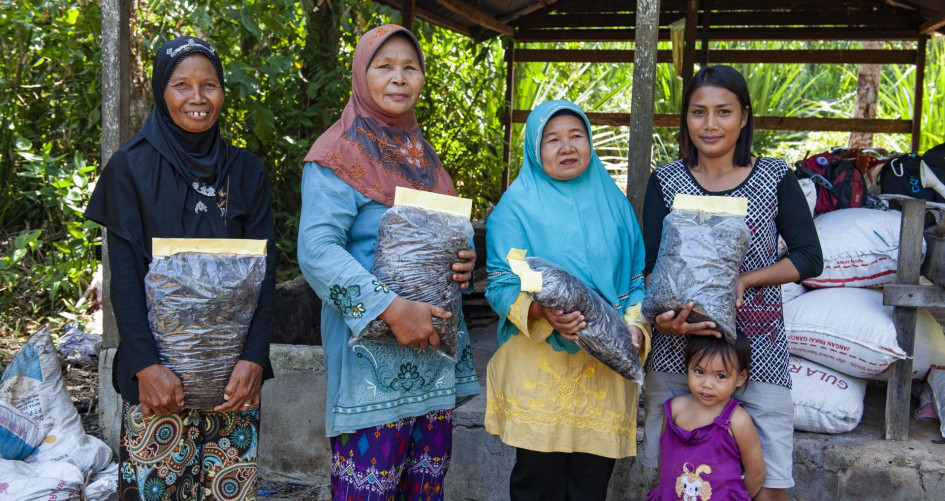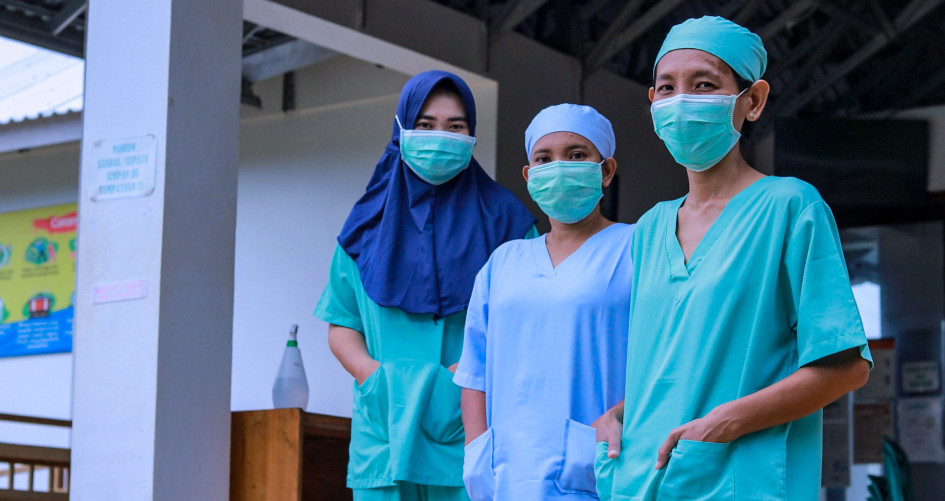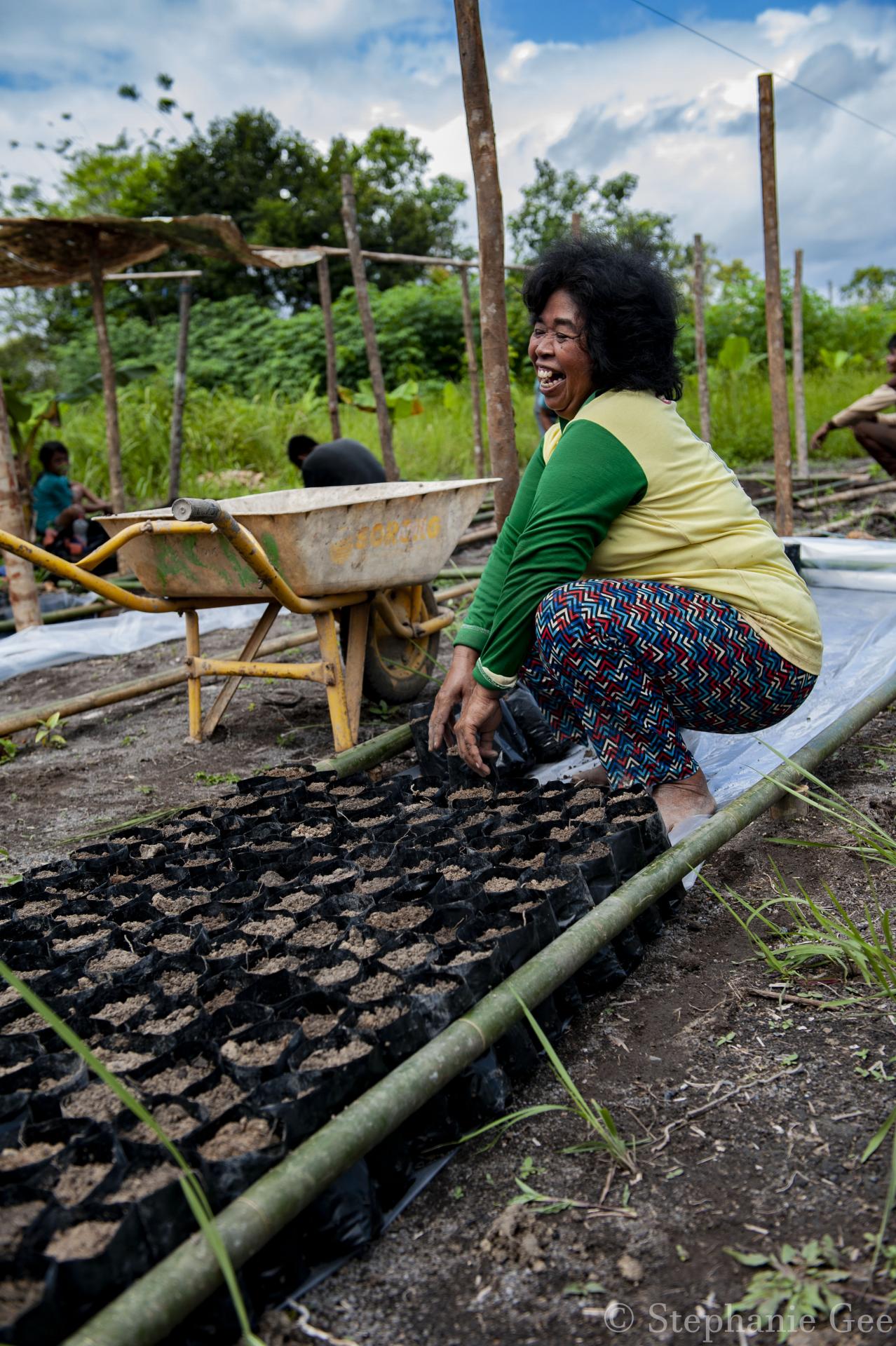Health In Harmony reverses rainforest deforestation by meeting the health and economic needs of surrounding communities through women-led innovation. In 2007, Health In Harmony began working around Indonesian Borneo’s Gunung Palung National Park (GPNP), a rainforest containing carbon-rich peat swamp. Health In Harmony’s innovative Radical Listening method found that most households depended on illegal logging, especially to pay for healthcare, and the average logger cuts 533 large trees per year.
Health In Harmony asked communities what they would need to stop logging. In response, communities developed the following programs with Health In Harmony and its sister organization Alam Sehat Lestari (ASRI): establishing a medical centre with discounts to communities that decrease illegal logging plus alternative payment methods such as rainforest seedlings; training former loggers in sustainable agriculture and empowering women farmers; and establishing reforestation projects.
Key facts
- Health In Harmony’s programs around Gunung Palung National Park in Indonesian Borneo have led to a 90% decrease in logging households, a 67% decrease in infant mortality, and a 55% decrease in the number of births-per-thousand-women.
- These programs have also resulted in the stabilization of primary forest loss, and 21,000 hectares of secondary forest regrowth in the park.
- Health In Harmony is now scaling up its women-led, planetary health model to sequester carbon with rainforest communities across the equator.
The challenge
Between 2000 and 2010, Indonesian Borneo lost 3,234 km² of forest annually, and Indonesia’s 2015 peat fires emitted more CO2 than the entire U.S. economy.
GPNP contains 725,000 kilograms CO2 per hectare. Its deforestation would release 72 teragrams of CO2 into the atmosphere. A Health In Harmony survey showed that most households logged illegally to afford healthcare, targeting the carbon-dense hardwoods.
The solution
Credit: Health in Harmony
Health In Harmony held Radical Listening sessions and asked communities what they would need to stop logging. In response, communities developed the following programs with Health In Harmony.
Health In Harmony operates a medical center, midwifery services, dental clinic, tuberculosis treatment, and ambulance on the border of GPNP for a population of 120,000. They offer tiered discounts to communities that decrease illegal logging and accept non-cash payments, such as rainforest seedlings, so households are not forced to log to pay for healthcare.
The Chainsaw Buyback program buys chainsaws from loggers and supports the female and male heads-of-household with seed money and mentorship to start their own small businesses. Health In Harmony has trained hundreds of former loggers in sustainable agriculture and empowered female farmers through the women-led Kitchen Gardens and Goats-for-Widows programs.
Health In Harmony has collaborated with park officials and community members to strategically reforest more than 175 hectares of orangutan corridors, illegal forest gardens, and carbon-rich peat swamps using seedlings sourced from patients’ non-cash payments for healthcare.
In collaboration with Stanford researchers, Health In Harmony recently published a peer-reviewed study in The Proceedings of the National Academy of Sciences Journal demonstrating that following community design and focusing on integrated solutions is essential to address the climate crisis. The impact of Health In Harmony's $5.2M investment over 10 years includes a 90% reduction in logging households, a 67% decrease in infant mortality, 21,000 hectares of secondary forest regrown, and $65.3M worth of carbon dioxide equivalent emissions averted. The study concludes that frameworks such as this are urgently needed advance effective policy efforts aimed at achieving the SDGs.
Helping the planet
Health In Harmony mitigates climate change through three strategies. The first strategy is preventing degradation. Health In Harmony’s healthcare and livelihood programs have allowed 90% of loggers to lay down their chainsaws. The Chainsaw Buyback program has supported 151 heads-of-household and their wives to develop small businesses, keeping an additional 37,000 old-growth trees standing.
The second strategy is reforesting. Since 2007, satellite imagery has shown 21,000 hectares of secondary forest regrowth in GPNP on previously-cleared land. By extrapolation, this regrowth is predicted to sequester 15 teragrams of CO2 over the coming decades.
The third strategy is preventing fires. Peat releases enormous amounts of CO2 when burned. Illegal farming has converted 19% of GPNP’s peat-swamp into flammable meadows, allowing peat to smoulder for months. Health In Harmony restores swamps by protecting seedlings with fire breaks and community fire-fighting.
Credit: Victorien Sylvere
Helping people
Since Health In Harmony began, communities surrounding GPNP have experienced a 67% decrease in infant mortality, 55% decrease in births per mother, and significant drop in persistent cough, diarrhea, and unintended weight loss. The ASRI Medical Center has conducted over 86,200 patient visits, 55% of whom are women. Health In Harmony’s all-women program of directly-observed tuberculosis treatment has provided medication to 700 patients in the last five years with a dropout rate of less than 1%.
The Kitchen Gardens program has helped 324 women grow and sell vegetables, and the Goats-for Widows program has provided 282 goats to elderly widows, allowing financial independence. Health In Harmony is led by women, and it has served as a springboard for many—from Hamisah, the Tuberculosis Program Coordinator who was the first woman elected leader of her village, to Dr. Nirmala, ASRI’s first executive director who has since earned an MPH from Harvard University on a Fulbright Scholarship and advised the Indonesian President on COVID-19 response.
Spillover effect
Health In Harmony is replicating its community-driven, women-led climate solution in central Borneo, Madagascar and, now, Brazil.
To scale up its Radical Listening methodology, Health In Harmony is developing an in-person and distance accredited training system to build a broader movement for women-led, community-driven climate solutions.




Images owned by the activity partners, all rights reserved.




